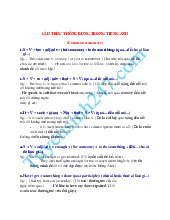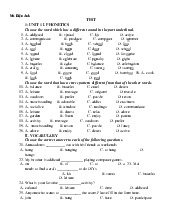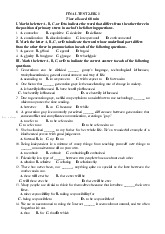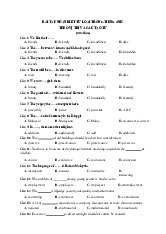




Preview text:
lOMoAR cPSD| 46836766
Lesson 1: Cấu trúc một câu trong tiếng anh
Cấu trúc 1 câu trong tiếng anh không bao giờ thiếu đó là chủ ngữ (S)+ động từ (V)
SUBJECT (chủ ngữ) – VERB (động từ) – COMPLEMENT (bổ sung) – MODIFIER (bổ nghĩa)
Cần phải nắm trắc các loại danh từ Sự
hòa hợp giữa chủ ngữ và động từ He speaks English very well.
Động từ số ít phải thêm ‘s’ lOMoAR cPSD| 46836766
My students speak English very well.
Danh từ đếm được số nhiêu, động từ sẽ không chia ở dạng số nhiều không ‘s’ A new plan was introduced.
Danh từ đếm được số ít bắt buộc phải có ‘a’ and ‘the’ (danh từ đếm được số ít không bao giờ đi một mình)
An increase in the number of such individuals is definitely positive.
‘An’ ở đây là số ít nên là ‘is’ chứ không phải ‘are’. Chia ‘s’ theo giới từ cuối cùng
The translation of these texts was sometimes lost or bewildering at best.
‘Of’ ở đây là giới từ cuối cùng nên ‘s’ phải chia theo giới từ cuối cùng. ‘translation’ là từ không
đếm được nên sẽ là ‘was’
The human race is destroying the Earth.
3 cách sử dụng ‘the’: the + noun of noun, ‘the’ sẽ đi với những thứ duy nhất, ‘the’ cũng có thể
dùng để nhắc lại nhóm ở câu trước
My friend and I are going to travel to Singapore this Summer.
‘are’ ở đây là số nhiều dùng để chỉ “my friend and I’
I or her friend is going to buy some milk.
‘or’ sẽ phải chia theo danh từ đứng sau ‘or’ hoặc danh từ gần nhất với động từ Nerther
I nor my friend s know about this problem.
‘nor’ giống như trên. ‘s’ là số nhiều nên ‘know’ sẽ không cần chia
Listen ing to English songs is a good way to learn English.
V làm chủ ngữ (hay là danh động từ). Thêm ‘ing’ vào động từ để biến nó thành một danh từ. ing
‘ing’ ở đây là một hành động nên phải chia ‘ing’ với động từ số ít là ‘is’
A number of students are suffering from stress and fatigue.
Khi dùng ‘a number’ sẽ cần quan tâm đến danh từ đằng sau
As hand-held devices become almost universal in our society, the number of accidents related to their
use is increasing accordingly, in addition to various social dangers. ‘the number’ là con số nên phải chia theo ‘is’
Another solution may be to use tax incentives to allow more home working, so that there is less
need to commute from the suburbs to the inner city for work.
‘there’ ở đây là chủ ngữ giả, chia động từ ‘is’ theo danh từ đăng sau nó ( dùng chủ ngữ giả khi
danh từ đằng sau quá dài)
There are valid opinion s on both sides, which I will consider now. lOMoAR cPSD| 46836766
‘s’ ở đây là số nhiều nên sẽ sử dụng ‘are’
Lesson 2: Các thì quan trọng trong tiếng anh và cách dùng Quá khứ (Past) Hiện tại (Present) Tương lai (Future)
Present tense (các thì hiện tại)
Simple Present (thì hiện tại đơn)
Thì này tường đi với các trạng từ chỉ thời gian như today, present day, nowadays,... và các trạng từ
chủ tần suất như: always, sometimes, often, every + thời gian... Example:
My wife brushes her teeth at 10PM every day. He walks. She learns Japanese. She watches movies every day.
Present Progressive (thì hiện tại tiếp diễn)
Thì này nói về những sự kiện đang diễn ra, đang thay đổi từ từ, đã có lịch trình rõ ràng, phàn nàn. Example:
We are trying to find out what happened.
I am having an appointment with my dentist this weekend.
He is always playing music so loud at night.
Present Perfect (thì hiện tại hoàn thành)
Những thứ đã xảy ra trong quá khứ, và đã có thể kết thức trong quá khứ và còn liên quan đến hiện tại. Example:
He has traveled around the world.
Kate has seen this movie three times.
She has lived in Hanoi for 20 years.
John has lived in Hanoi since 2000. I have already known him. We have known him already.
We have not known each other yet.
So far, I have not been able to contact her. lOMoAR cPSD| 46836766
There has been an increase in petrol prices recently.
I have never done this before.
Present Perfect Progressive (hiện tại hoàn thành tiếp diễn) Diễn
ra ở hiện tại or quá khứ và có thể tiếp tục xảy ra trong tương lai. Example:
She has been living in Hanoi for 20 years.
= She has lived in Hanoi for 20 years.
Past tenses (các thì quá khứ)
Simple Past (thì quá khứ đơn)
Nói về những thứ đã xảy ra trong quá khứ và kết thúc trong quá khứ, có thời gian nhất định. Example:
I traveled to Da Nang 3 years ago.
She cooked me the most delicious meal last night.
Simple Past (thì quá khứ đơn)
Nói về một sự việc đang xảy ra tại một thời điểm trong quá khứ. Example:
I was watching TV at seven o’clock last night.
I was studying English when she called me.
I was studying English while my wife was cooking.
Past Perfect (thì quá khứ hoàn thành)
Nói về những thứ gì đó đã xảy ra trước đó or trong câu điều kiện loại 3. Example:
Linda came when her boyfriend had left the room.
= Linda came after her boyfriend had left the room.
= Before Linda came, her boyfriend had left the room.
Sử lỗi cho các động từ:
Stan would always sat (sit) next to him, and he used the opportunity to make fun of him in many
different ways, like calling him manes and taking away his stuff and, well… bullying him. Regularly.
Like, every day. And Julian never do (did) anything; he just asked him to stop – quite politely, as he is
(was) too scared to even look at him. This only annoyed Stan even more. So this continued, like, for
months on end, and it gets (got) to the point where Julian would usually sit in the classroom during
breaks so that Stan wouldn’t had (have) a chance to mess with him. And then one day, Julian stopped
coming to school. Stan thought that maybe he had gottened sick, but he don’t (didn’t) care that much lOMoAR cPSD| 46836766
– he is (was) the only guy like that in the school. One day, Stan’s mom got really angry with him,
basically because of everything – his grades, his attitude, everything; and he didn’t wanted (want) to
hear it, so he left home when she fell asleep. Vocabulary:
Calling him names: đạt biệt danh cho những thanh niêm dumb
For months on end: hàng tháng liền
Future tenses (các thì tương lại)
Simple Future (thì tương lai đơn)
Đưa ra đề nghị một cách lịch sự:
Shall I get you a cup a of water?
Dùng để mời người khác một cách lịch sự: Shall we go now?
Dùng để mặc cả khi mua bán:
Shall we say :10$? Or Can you do 10%?
Phỏng đón hoặc đưa ra quyết định tại thời điểm nói: I’ll tell her that.
Near Future (tương lai gần)
Nói về những dự định trong tương lai gần. Example:
We are going to find out what happened to him sooner or late.
We are going to take an IELTS test next year.
Future Perfect (thì tương lai hoàn thành)
Nói về những thứ trong tương lai đến thời điểm đó nó đã phải xảy ra rồi.
You will have learned the most important things in English by the time you finish this book.




